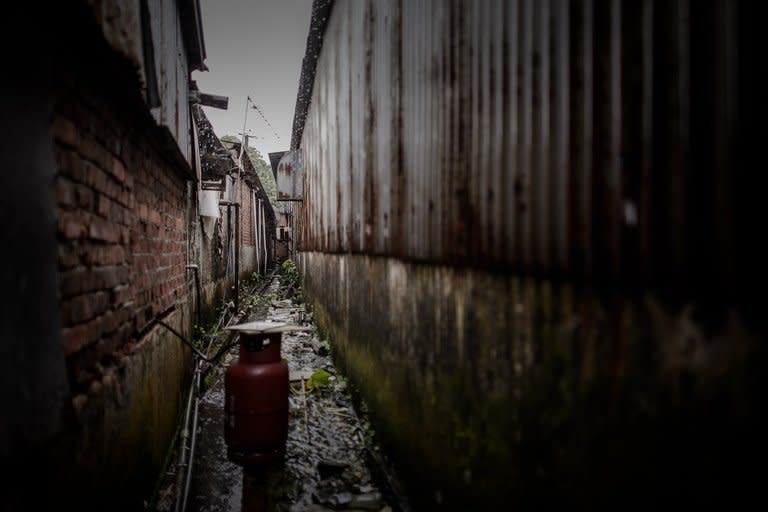Asylum seekers in Hong Kong face dire conditions
Hong Kong may be one of Asia's wealthiest banking and luxury hubs, but the picture is very different for hundreds of asylum seekers forced into slum-like conditions as they scrape a living in the city, say campaigners. Those fleeing persecution and torture in their homelands are attracted to Hong Kong's rule of law and visa-free entry for many nations, but can languish for years in a system mired in ambiguity. Many are forced to work illegally to make ends meet, rights groups say. The Ping Che region of the territory near the border with mainland China is home to a sprawl of makeshift huts made of corrugated iron plates and brick that house more than 100 people seeking protection. In one unit, a small communal toilet is shared between 10 residents and runs into an open sewer. Some of these flimsy shacks house up to a dozen people, in stark contrast to the multi-million dollar luxury apartments to be found elsewhere in the city. One asylum seeker from Bangladesh who identified himself as Ali was smuggled into Hong Kong through mainland China four years ago. "We are refugees, not beggars or criminals," Ali told AFP, saying only that he left Bangladesh because of "some political problems, because of political pressure." Hundreds of refugees live in dozens of compounds "in different states of disrepair and illegality" across the city's rural New Territories district, said Cosmo Beatson, director of VisionFirst, an organisation providing support to asylum seekers. "We find, visiting these compounds that it's quite inhuman, often illegal and a situation that is just not right for Hong Kong," he said. Qualifying asylum seekers are given a rental allowance of HK$1,200 ($154) paid directly to their landlords. But the cheapest sub-divided rooms cost around HK$2,000, say campaigners, forcing them into the squalid conditions found at Ping Che where they can avoid paying rental deposits. "You are forcing (asylum seekers into the underground working environment, where they have to interface with the underground economy," said Beatson. Like many of his counterparts, Ali has resorted to working illegally to make ends meet -- which carries high risks. Two asylum seekers face 15 months in prison after they were arrested for working illegally at a junk yard in May. Even voluntary work is banned. "This is ridiculous, nobody can accept this," said Ali. "We are human, so we must survive, we have to complete our basic needs, so that's why you go to work." Many work at part-time jobs in shipping container and scrap yards where they earn around US$20 to $30 for a 12-hour shift. There are currently more than 5,000 people seeking protection from persecution and torture from southeast Asia and Africa waiting for their cases to be heard in Hong Kong, say rights groups. The issue is a complicated one for the territory, where there are two main paths for application. One is overseen by the United Nations High Commissioner for Refugees (UNHCR), the other by the government. The UN's 1951 Refugee Convention, of which mainland China is a signatory, has not been extended to Hong Kong, which says it therefore has no legal obligation to grant asylum to refugee cases. It refers these to the UNHCR, which then sends those cases elsewhere. There are 91 refugees recognised by the UN agency in Hong Kong, it says. It can take "three to four years" for their claims to be processed by the UN, said pro-democracy lawmaker Dennis Kwok, often meaning a period of hardship and legal limbo. "What are they to do? The government is showing quite a lot of reluctance in giving further assistance to these refugees," Kwok said. However, the UN Convention Against Torture (CAT) does apply to Hong Kong, which cannot return anyone who is believed to face the threat of torture back home. But it has no system to forward these cases to other countries. Only seven asylum seekers have been recognised by the Immigration Department under the convention since 2009. But there is some optimism after two recent rulings by the Court of Final Appeal saw the criteria expanded beyond "torture" alone. Hong Kong now says it offers assistance that complies with human rights conventions and local laws and does not deport those who face torture, cruel, inhumane or degrading treatment back home. "The HKSAR Government provides in-kind humanitarian assistance to torture and asylum claimants in Hong Kong to prevent them from falling into a state of destitution," the government said in a statement. In light of the two rulings, the government said it is planning to unify the screening mechanism for those seeking protection, which would increase the chances of having their claims recognised, according to Hong Kong-based human rights lawyer Mark Daly. "The success rate has been so low under the torture claims system. But if it gets working in a fair and proper way then hopefully it will be better," Daly said.




